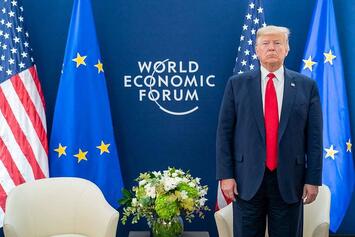
I thought crack-smoking had lost its appeal, but perhaps it is still a regular pastime among journalists determined to take down Trump’s America. The Economist, for example, has suggested that “the land of the free” has moved across the Atlantic, from America to Europe. The continent, the magazine claims, is now the best place to enjoy the “pursuit of happiness”, while embracing “moral norms” on following climate edicts, fostering free trade and preventing oligarchal overreach.
Really? They certainly can’t be thinking of the “pursuit of happiness” in terms of economic opportunity. Even The Economist cannot hide the fact that Europe is an economic laggard compared not just to America, but to China and increasingly India, now estimated to be the world’s fifth largest economy. Over the 15 years to 2023, the eurozone economy grew by about 6 per cent, measured in dollars, compared with 82 per cent for the US, according to International Monetary Fund data.
To put it another way, the most powerful economy on the European continent is barely larger than my adopted home state of California. Two decades ago, one could legitimately see Europe, with its own regime of protectionist policies, as a third force in the world economy. Today this is no longer the case.
The most obvious weakness is in tech, whose oligarchs The Economist seems to dislike. Of the top 50 tech firms in the world, only three are located on the continent, with the list dominated largely by the United States and China a firm second. But the entrepreneurial gap is deeper than tech. Even at the grassroots level, as American entrepreneurs have flourished in the past decade and self-employment has grown, those in Europe have actually declined.
Rather than meet this competitive challenge, the European, and British, default seems to be battening down the hatches. Too many insist that the priority should be to preserve both their massive welfare states and the draconian climate regime. Mario Draghi’s much ballyhooed response to the EU’s current crisis focuses on doing more of all the things that bedevil Europe, notably its green obsessions, devotion to social “inclusion”, and ever greater control from Brussels.
Hope springs eternal in London, Paris, and Brussels. Some believe that money fleeing Trumpian chaos will turn their fortunes, but it’s unlikely that investors will go long-term to a place with little in the way of entrepreneurial opportunities or to economies far more export dependent than the US. Perhaps more attention should be paid to the surge of investment – estimated now at as much as $7 trillion – from companies seeking to relocate or expand in the US.
The current European regime is wasting its enormous stockpile of talented and creative people. Many move abroad or find themselves tied to an economy increasingly dependent on tourist dollars. Tourism has a dual effect: some benefit but it doesn’t provide a lot of opportunity.
Even as they disdain Trump, Europe’s leaders might consider embracing some of his policies. For example, there appears to be no way to follow “net zero” strictures – now largely gone in America – without facing “energy suicide”. High energy prices, combined with electrical vehicle mandates, surely all but guarantee that Europe will lose its grip on the car market to Chinese producers. Germany’s entire industrial structure seems likely to decline: it could lose upwards of 400,000 of its estimated 800,000 auto jobs by 2030.
China, not a tariff-imposing America, is eating away at Europe’s fading industrial economy. Europe’s “net zero” policies play right into the hands of a country that seeks to export its batteries and EVs, but is still massively reliant on coal, making it by far the world’s largest emitter of CO2. China also has an interest in speeding Britain’s already rapid deindustrialisation, as the recent scandal at the Scunthorpe steelworks showed so vividly.
Europe might also seek to pick up on Trump’s tight control over the US border. European leaders seem disdainful towards their own citizens, even though they are already voting for anti-migrant, nationalist and culturally conservative candidates, such as Italy’s Giorgia Meloni. At the same time, the role of unvetted migrants in undermining order on the streets of the continent’s cities simply undermines one of Europe’s great assets, its uniquely beautiful and formerly safe urban centres.
Remarkably, some Europeans think that, as a way to get back at America, Europe should seek to pivot to China. Britain’s Keir Starmer, as a way to “Trump proof” his declining realm, has appeared especially willing to embrace this notion. A huge new Chinese embassy near the Tower of London looks increasingly likely to be built, the largest such diplomatic mission in Europe. Some fear it will prove a convenient base to snoop on Britain’s Chinese population and influence its political elites.
This piece first appeared at: Telegraph.
Joel Kotkin is the author of The Coming of Neo-Feudalism: A Warning to the Global Middle Class. He is the Roger Hobbs Presidential Fellow in Urban Futures at Chapman University and and directs the Center for Demographics and Policy there. He is Senior Research Fellow at the Civitas Institute at the University of Texas in Austin. Learn more at joelkotkin.com and follow him on Twitter @joelkotkin.
Photo: Picryl, Government Work/Public Domain.












